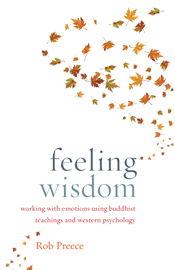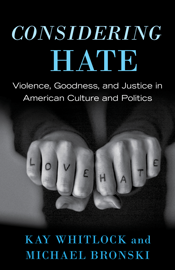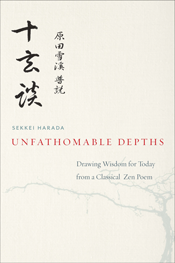
Hardly your conventional touchy-feely, quasi-spiritual amalgam, Rob Preece’s Feeling Wisdom (Shambhala Publications, January 2015, $15.95, 128 pp., paper), a crash course on emotional fluency, delivers a cogent argument for why the psychologization of Western Buddhism is not only inevitable but ultimately beneficial.
Preece, a transpersonal psychologist and decades-long Buddhist practitioner, rejects what he understands as the religion’s labeling of emotional life as a personal affliction or spiritual impediment—an attitude he attributes to the cultural mores surrounding Buddhism’s Asian traditions, especially the Tibetan Buddhism with which he’s most familiar. While he acknowledges that a “growing number” of Tibetan teachers, most notably His Holiness the Dalai Lama, “are really looking at . . . how we may need to bring Buddhist knowledge together with modern psychological understanding,” Preece nevertheless spends many of the book’s pages establishing the relevance of feeling to practice. Like a one-man chorus, he asserts and reasserts that our emotions are not obstacles but the very “raw material of awakening. And if we disregard them,” he warns, “we miss a vital resource.”
Feeling Wisdom owes much to Mark Epstein’s landmark work Thoughts Without a Thinker (1995), but reveals itself to be a mirror image. Whereas Epstein wrote from the perspective of the psychotherapist and invoked Buddhism as a supplement for the shortcomings of the Western psychoanalytic tradition, Preece speaks from the vantage of the experienced practitioner yet repeatedly calls upon Carl Jung for corrective insight. Preece’s primary objective is to arm Western Buddhists with concepts and practices that address emotions—not just their experiential qualities, but their potential underlying trauma, which can be resolved, he says, through a combination of meditative awareness and talk therapy.
Preece may be right that the need for his book derives from the emotional suppression native to Buddhism’s Asian context, but the work’s potential to misguide relates to a particularly Western peculiarity: the narcissism that too often co-opts internal inquiry as an endless reaffirmation of, rather than questioning of, the self.

At the heart of Kay Whitlock and Michael Bronski’s Considering Hate(Beacon Press, January 2015, $26.95, 172 pp., cloth) lies an unsettling paradox: the more fervently we condemn violence, the worse it gets. When we demonize violent acts and their perpetrators, they argue, we thereby exonerate society from its contributing ills: wealth inequality, race and gender discrimination, and macho culture, to name a few. That’s why the writers, both longtime queer-justice activists, oppose hate crime legislation. To them, it represents a legal instantiation of America’s appetite for easily digestible narratives focused on person-to-person animus, or “hate frames” (as they call them). In order to reduce violence, oddly enough, we must first destigmatize it.
This argument foists on the authors a compelling but virtually impossible task: to crown nurture the victor over nature, then apply the results to the intractable social problem of violence, broadly defined. One wonders what greater forces Whitlock and Bronski might invoke to explain twins poking each other in the crib—gentrification, perhaps, causing them claustrophobia. The authors’ habit of leaping from one inference to the next will frustrate readers, but even so, Considering Hate is a worthwhile provocation. It expands notions of violence to include large-scale racial or economic inequity and challenges the tenet of personal culpability that underlies our entire justice system. “Responsibility,” Whitlock and Bronski declare, “must be separated from punishment.” In so roundly opposing the aphorisms of our schoolteachers, the authors hope their thesis will open “new understandings of collective moral engagement and agency rooted in an ethic of interdpendence rather than retribution.”

Sekkei Harada is old school—plain and simple. Ordained in 1951 and abbot of Hosshinji, a Soto Zen monastery in central Japan, since 1974, he counts over six decades of rigorous practice to his name. Unsurprisingly, he turns to a millennium-old poem in Unfathomable Depths (Wisdom Publications, December 2014, $18.95, 248 pp., paper), a firstever English translation of dharma talks he delivered in 1998 and 1999 that explicate an obscure 10th-century Chinese work called “Ten Verses of Unfathomable Depth” by Zen Master Tong’an Changcha. In the original, each of the poem’s verses contains eight lines and each line is composed of seven Chinese characters. These formal strictures befit Harada’s approach to Zen, which prizes discipline and shuns the lax mantra of “just doing” that he finds so characteristic of contemporary Zen sanghas, especially those in the West. Even the obscurity of the poem—one, we’re told, that is “unfamiliar to all but specialists”—reinforces Harada’s critique of a shrunken canon.
The poetry translation itself is by Daigaku Rummé, a longtime Soto monk and student of Harada’s, who admits to making no “attempt to render either the symmetry in length nor the rhyme” of the original. Readers will rejoice at Rummé’s indiscretion, however, as the liberal rendering allows for rhetorical flourishes like this one, describing wordless enlightenment, that concludes the poem: “From the bottom of your heart, you play a melody on the harp with no strings. / How would it be possible to grasp the moonlight shining in the empty sky?”
It seems no accidental irony that Harada chose intoxicating verse as the inspiration for a set of dharma talks that unreservedly chastise the state of modern Soto Zen, most generally for its deviation from traditional rigor. His specific critiques are threefold: lamenting the reduction of standards for dharma transmission; rejecting the common choice to teach multiple koans to the same student and thereby induce gradual enlightenment; and dismissing the recent fetish for the moment just as it is. For Western practitioners these criticisms will feel, at times, like those of an aged master pining for a bygone era. Still, Harada’s unapologetic call for discipline is a valuable counterpoint to the trend toward more accessible, less demanding Buddhism.
Thank you for subscribing to Tricycle! As a nonprofit, we depend on readers like you to keep Buddhist teachings and practices widely available.